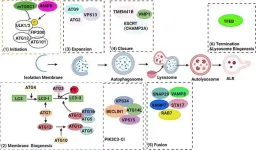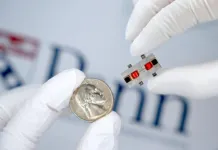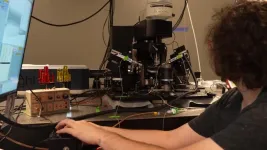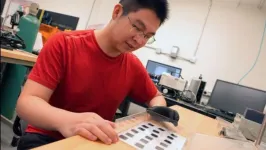(Press-News.org) Singapore, 24 May 2024 – Two multi-institution and multidisciplinary Singapore teams of clinician-scientists and researchers have been awarded grants of S$25 million each, by the Singapore Ministry of Health through the NMRC Office, MOH Holdings Pte Ltd, under the NMRC Open Fund-Large Collaborative Grant (OF-LCG) programme. The S$50 million support for cancer research establishes the SYMPHONY 2.0 and Colo-SCRIPT research programmes to drive precision oncology research in Singapore aimed at improving the understanding, diagnosis and treatment of lymphoma and colorectal cancer.
Led by the National Cancer Centre Singapore (NCCS), in collaboration with the Agency for Science, Technology and Research (A*STAR), the Cancer Science Institute of Singapore (CSI Singapore) and the Yong Loo Lin School of Medicine (NUS Medicine) at the National University of Singapore (NUS), the National University Cancer Institute, Singapore (NCIS), the National University Hospital (NUH), Lee Kong Chian School of Medicine (LKCMedicine) at Nanyang Technological University, Singapore (NTU Singapore), Singapore General Hospital (SGH) and other institutions, the SYMPHONY 2.0 (Singapore lYMPHoma translatiONal studY 2.0) research programme will address unmet needs in Asian-centric lymphomas and improve patients’ outcomes by developing cost-effective, accessible, and innovative treatment modalities.
The Colo-SCRIPT (Colorectal cancer subtype-specific research informs phenotypes, diagnostics & treatments) research programme is co-led by NCCS and A*STAR, in collaboration with institutions in the SingHealth-Duke-NUS Academic Medical Centre, the National University Health System (NUHS), NUS, the National Healthcare Group (NHG) and NTU’s LKCMedicine, that will use a subtype-specific approach to improve the understanding of colorectal cancer so that for each subtype, the team can implement prevention and early detection strategies to reduce incidence, and test novel therapies in clinical trials.
Cancer is the leading cause of death in Singapore accounting for 28.2% of all deaths from 2017 to 2021.[1] Cancer incidence has risen over the years making the need to better understand, prevent and treat the disease a pressing need. A key challenge in treating cancer is that cancers are often regarded as homogenous. However, patient data shows that the disease presents differently, with great variance in each individual’s cancer development and response to treatment.
The complexity and heterogeneity of cancer has motivated current research done by both the SYMPHONY 2.0 and Colo-SCRIPT teams to develop precision approaches that can be adopted to improve patient outcomes. Recognising the value of these efforts, the OF-LCG provides support to further build on the foundations of existing work done and move these discoveries towards clinical applications.
SYMPHONY 2.0 – Improving outcomes for Asian-centric lymphomas
Lymphomas are the fifth most common cancer in Singapore, with more than 5,000 new cases diagnosed between 2017 and 2021. It is also the most common blood cancer in adolescents and young adults (aged 16-45).[2] Alarmingly, the global incidence of lymphoma has surged by 168% since 1975[3] with this trend indicating that Singapore will face increasing health burden from the disease. Historically, lymphoma subtypes have been more thoroughly studied in Western populations making the advancement of the diagnosis and treatment of Asian-centric lymphomas a challenge.
One example of a lymphoma prevalent in Asian populations is an aggressive form of blood cancer called Natural Killer/T-cell lymphoma (NKTCL). In Asia, 15-20% of all lymphomas are classified as NKTCL, compared to the 5-10% in Western countries. Survival rates for NKTCL are poor and this cancer remains less studied, poorly understood, and has limited treatment options. Even with combination chemotherapy, only 20 to 30% of patients survive beyond five years and as many as 30% of patients do not respond to chemotherapy.[4]
SYMPHONY 2.0 is a continuation of 10 years of work by this group, under the Translational and Clinical Research (TCR) Flagship Programme and SYMPHONY 1.0, which has laid the groundwork to establish Singapore as a hub of translational and clinical expertise in lymphomas. The group has published over 100 studies on Asian-centric lymphomas in top ranked scientific journals, augmenting understanding of the disease. They have also developed enhanced diagnostic and prognostic tools to guide clinical decision-making and identified biomarkers for response to therapeutics that have been incorporated into clinical assays. In addition, they have trained a genomic model to determine the prognosis of NKTCL patients more precisely.
SYMPHONY 2.0 will build on the expertise and knowledge of the group while leveraging emerging technologies to address unmet needs in Asian-centric lymphomas and improve patient outcomes. The programme will focus on 5 thematic areas, with the goal of delivering 3 key projects – establish a Lymphoma Atlas that centralises patient data for research, determine effective drug combinations for lymphoma patients in clinical trials using AI, and improve accessibility to CAR-T Cell therapy through proof-of-concept studies [See Annex A].
SYMPHONY 2.0 Corresponding Principal Investigator Professor Lim Soon Thye, CEO of NCCS and Senior Consultant in the Division of Medical Oncology at NCCS, and Tanoto Foundation Professor in Medical Oncology said, “Our research programme brings together an extensive network of local collaborators and academic partners to tackle the unmet clinical needs and challenges in lymphoma. The vibrant ecosystem in Singapore, backed by strong infrastructure and talented manpower, enables us to optimise the translation of discoveries from bench to bedside.”
SYMPHONY 2.0 Theme 2 PI Professor Chng Wee Joo, who is Provost’s Chair Professor in the Yong Loo Lin School of Medicine, NUS, and Senior Consultant in the Division of Haematology at NCIS, said, “Translational research is the cornerstone of progress in lymphoma treatment. Support by the NMRC and the OF-LCG programme is crucial in this endeavour, as they provide the necessary funding to support extensive research, clinical trials, and the development of new technologies.”
SYMPHONY 2.0 Theme 5 PI Professor Sebastian Maurer-Stroh, who is Executive Director of A*STAR’s Bioinformatics Institute (BII) said, “By integrating multi-omic and clinical data for rare and common lymphomas, this team is establishing an Asian Lymphoma Atlas which will transform lymphoma care through artificial intelligence.”
Colo-SCRIPT – Harnessing the biology of each subtype of Colorectal Cancer to develop strategies, tailored to each subtype, for prevention, early detection and treatment
In Singapore, colorectal cancer (CRC) is the most common cancer affecting both genders. There were 12,239 new cases of colorectal cancer diagnosed between 2017 and 2021, approximately 7 new cases a day.[5] CRC originates from pre-cancer lesions called colorectal neoplasia (CRN), or polyps. New evidence from patient samples and research data now show that the early lesions and more advanced tumours may be group into distinct entities or molecular subtypes. Importantly, the biological subtypes of pre-cancer and cancer lesions are connected, with distinct biological programmes activated as the different subtypes of pre-cancers advance to become their respective subtypes of cancer. Despite these diverse characteristics across the different tumours, the detection, workup, clinical characterisation, and management of colorectal cancer is typically performed as if CRC and CRN were a single disease. The team seeks to use the distinct biology of the different subtypes to optimise treatment outcomes.
Colo-SCRIPT is the first national CRC research programme. Leading up to this programme, the clinicians and scientists in the Colo-SCRIPT team have published research findings in high impact journals, such as Nature Genetics, refining the molecular classification of CRC. Using state-of-the-art techniques such as single cell analyses to profile the patients’ tumours at high resolution, they are beginning to resolve the complex nature of the tumours and reveal how one tumour may be different from the other, and how clinicians may exploit the uniqueness of an individual’s tumour to better tailor precision treatment. As a start, the team is currently evaluating biological features that can be purposed either as blood tests for cancer detection or new drug targets for the different cancer subtypes. More recently, the team has embarked on the use of AI-guided endoscopy for detection of early lesions, particularly of the more aggressive subtypes. The findings can guide the better management and follow-up of individuals harbouring the precancer lesions.
The Colo-SCRIPT research programme seeks to harness insights on the distinct biology of different molecular subtypes in CRC to guide subtype-specific prevention, diagnosis, and treatment of disease. The programme will enrol 2 national cohorts: SCRIPT 1 and 2 in early and late-stage disease respectively. Through 5 thematic areas (pre-cancer, molecular epidemiology, cellular vulnerabilities, immunotherapy, and diagnostics), the programme will translate research findings to 2 key clinical applications termed “receptables”: (1) improve the prevention and detection of CRC as a long-term strategy for reducing CRC incidence; and (2) bring new drugs into clinical trials for improving treatment outcomes for advanced colorectal cancer patients [See Annex B].
Associate Professor Tam Wai Leong, Deputy Executive Director of A*STAR’s Genome Institute of Singapore (GIS), and Scientific Chair of Colo-SCRIPT said, “It is increasingly clear that colorectal cancer is composed of distinct molecular subtypes and therefore patients need to be managed and treated differently. The one-size-fits-all approach should no longer be the way forward. By better understanding the underlying mechanisms of the complex disease, we will have an opportunity for early intervention to interrupt disease progression and eventually, develop tailored treatment strategies which are more effective for patients.”
Associate Professor Iain Tan, Senior Consultant in the Division of Medical Oncology, NCCS, Goh Hak Su Professor in Colorectal Surgery and Clinical Chair and Corresponding Principal Investigator of Colo-SCRIPT said, “We have brought together Singapore’s leading clinicians and scientists in colorectal cancer to embark on a first-of-its-kind subtype-biology focused study that spans the entire clinical trajectory of disease from pre-cancer to advanced cancer. Working together across disciplines and institutions, we are excited to launch this national initiative to tackle our most common cancer. Singapore seeks to pioneer a subtype-specific paradigm for the efficient and effective prevention, diagnosis, and treatment of colorectal cancer.”
The Open Fund-Large Collaborative Grant (OF-LCG) Programme
The OF-LCG grant call aims to bring together the best teams from public institutions to advance human health and wellness, as well as create economic value for Singapore and Singaporeans through the pursuit of excellence in research and its applications.
SYMPHONY 2.0 and Colo-SCRIPT are supported by the National Research Foundation Singapore (NRF) under the Open Fund-Large Collaborative Grant and administered by the Singapore Ministry of Health through the NMRC Office, MOH Holdings Pte Ltd.
ANNEX A
SYMPHONY 2.0 THEMES AND PIs
Theme 1
Refining and enhancing lymphoma diagnosis, classification, and risk stratification
Led by Associate Professor Ng Siok Bian, Department of Pathology at the Yong Loo Lin School of Medicine, National University of Singapore (NUS Medicine), and supported by Dr Chen Jinmiao, Bioinformatics Institute (BII) and Institute of Molecular and Cell Biology (IMCB), A*STAR.
Theme 2
Spatial phenotypes of drug resistance in aggressive lymphoma
Led by Assistant Professor Anand Jeyasekharan, Cancer Science Institute of Singapore, NUS, and the National University Cancer Institute, Singapore (NCIS); and supported by Dr Chen Jinmiao, BII and IMCB, A*STAR
Theme 3
Overcoming immune evasion in lymphoma
Led by Associate Professor Ong Choon Kiat, National Cancer Centre Singapore (NCCS), supported by Associate Professor Navin Kumar Verma, Nanyang Technological University, Singapore and Dr Nicholas Grigoropoulos, Singapore General Hospital
Theme 4
Developing novel platforms and assets for therapeutic drug discovery in lymphoma
Led by Professor Chng Wee Joo, NCIS and National University Health System, supported by Associate Professor Olaf Rötzschke, Singapore Immunology Network (SigN)
Theme 5
Transforming lymphoma care through Artificial Intelligence and integration of clinical, molecular and socioenvironmental data
Led by Professor Lim Soon Thye, NCCS, and supported by Asst Prof Valerie Yang, NCCS and IMCB, A*STAR, Dr Woo Xing Yi, BII, A*STAR, and by Dr Chen Jinmiao, BII and IMCB, A*STAR.
3 Key Projects:
1. Establish the Lymphoma Atlas for Multidimensional Investigations in Asian populations (LAMINA), a resource for clinician-scientists and scientists that centralises comprehensive patient and preclinical model data, including molecular data, family history, genetics, socioenvironmental factors and psychological data, allowing for a holistic approach to understanding lymphoma. This resource will be driven by Artificial Intelligence (AI) and enable the generation of data and discoveries precisely tailored to characteristics of lymphomas unique in Asian populations.
2. Implement Quadratic Phenotypic Optimized Platform (QPOP), a novel AI-driven digital medicine platform, that can identify 2- or 3-drug combinations, from existing approved drugs, tailored for patients to treat relapsed/refractory (RR) T cell lymphomas as well as refractory aggressive B cell lymphomas as part of a Phase II clinical trial. An example of personalised medicine, it is predicted that that a viable recommendation can be made in approximately 90% of patients and is an example of cost-sensitive personalised healthcare.
3. Make CAR-T cell therapy more accessible and effective for patients with refractory/relapsed aggressive B cell lymphomas. High cost and potential side effects pose significant challenges to widespread adoption of the therapy. The group will conduct proof-of-concept studies to facilitate patient access to CAR-T cell therapies, demonstrating feasibility and effectiveness and pave the way for broader adoption with the ultimate goal of benefitting a larger population of patients.
ANNEX B
Colo-SCRIPT THEMES AND PIs
Theme 1
Early Carcinogenesis - Decoding early events influencing transitions through pre-invasive to invasive cancer
Led by Professor Ashok Venkitaraman, Cancer Science Institute of Singapore, NUS and Institute of Molecular and Cell Biology (IMCB), A*STAR, and Dr Shyam Prabhakar, Genome Institute of Singapore (GIS), A*STAR
Theme 2
Molecular Epidemiology - Establishing the role of environmental, metabolic and microbial risk factors enabling disease progression
Led by Professor Vinay Tergaonkar, IMCB, A*STAR and Associate Professor Sunny Wong, Nanyang Technological University, Singapore
Theme 3
Cellular Vulnerabilities - Harnessing functional genomics to discover subtype-specific (epi)-genetic & metabolic dependencies to expose therapeutic vulnerabilities
Led by Associate Professor Tam Wai Leong, GIS, A*STAR and Professor Patrick Tan, Duke-NUS Medical School
Theme 4
Tumour Immunology - Deciphering the tumour immune microenvironment (TIME) for improving immunotherapies
Led by Associate Professor Iain Tan, National Cancer Centre Singapore (NCCS) and Professor Li Qi-Jing, IMCB and Singapore Immunology Network (SIgN), A*STAR
Theme 5
Detection & Characterisation - Developing diagnostic tools for subtype-specific clinical detection & characterisation
Led by Professor Joseph Sung, Nanyang Technological University, Singapore and Professor Tony Lim, Singapore General Hospital
2 Key Receptacles:
1. Prevent and detect CRC early to improve population health and reduce economic burden associated with disease progression. Through the recruitment of 20,000 individuals undergoing in the SCRIPT-1 clinical cohort, the team will develop new subtype-specific diagnostic methods and investigate the influence of genetic, environmental, metabolic and microbial risk factors on CRN and CRC subtypes.
Key Projects: (1) Pre-cancer atlas: detailed characterization and experimental study of the early molecular events that mediate the transition from normal colon to pre-cancer to early cancer of each subtype. Integrated with environmental influences, findings may inform cancer prevention. (2) Early detection methods: The team will develop new non-invasive blood and stool tests and new AI-enabled endoscopy methods to complement or improve current screening methods for improved detection of different CRN/CRC subtypes.
2. Develop therapies for patients with advanced colorectal cancers by identifying subtype-specific targets and implement novel therapeutics for disease intervention. 1,000 patients will be recruited for the SCRIPT-2 clinical cohort to build a biospecimen repository and develop patient-specific tumour models for the deep profiling of tumour subtypes. The findings are expected to empower large-scale therapeutic trials aimed at precision treatment of CRC.
Key Projects: (1) Cellular vulnerabilities: detailed study of the epigenetic and metabolic dependencies of the different CRC subtypes will provide candidate targets which will be evaluated in patient-specific tumour models, leading to development of subtype-specific therapeutics; (2) Immunotherapy: Examining mechanisms by which different subtypes of cancers evade host immune control, the team will identify and develop biopharmaceuticals and cellular therapies, particularly CAR-T cell therapies that are specifically effective against respective subtypes.
[1] National Registry of Diseases Office. (2023). Singapore Cancer Registry Annual Report 2021. Retrieved from: https://www.nrdo.gov.sg/docs/librariesprovider3/default-document-library/scr-ar-2021-web-report.pdf?sfvrsn=591fc02c_0
[2] National Registry of Diseases Office. (2023). Singapore Cancer Registry Annual Report 2021. Retrieved from: https://www.nrdo.gov.sg/docs/librariesprovider3/default-document-library/scr-ar-2021-web-report.pdf?sfvrsn=591fc02c_0
[3] Thandra KC, Barsouk A, Saginala K, et al: Epidemiology of Non-Hodgkin's Lymphoma. Med Sci (Basel) 9, 2021
[4] Yoon SE, Kim SJ, Kim WS: Overview of the current treatment strategy in extranodal NK/T-cell lymphoma: from diagnosis to recurrence. Annals of Lymphoma 5, 2021
[5] National Registry of Diseases Office. (2023). Singapore Cancer Registry Annual Report 2021. Retrieved from: https://www.nrdo.gov.sg/docs/librariesprovider3/default-document-library/scr-ar-2021-web-report.pdf?sfvrsn=591fc02c_0
END
SG ramps up cancer fight with S$50 million in national grant funding for precision oncology
Two multi-institution Singapore teams have been awarded $50 million in national grants for precision oncology research aimed at improving outcomes for lymphoma and colorectal cancer
2024-05-24
ELSE PRESS RELEASES FROM THIS DATE:
Autophagy in pancreatitis
2024-05-24
Researchers are exploring a new potential avenue for pancreatitis treatment: autophagy, a cellular recycling process. Autophagy helps maintain healthy pancreatic acinar cells by removing damaged organelles like mitochondria and the endoplasmic reticulum (ER).
A new review published in eGastroenterology highlights the link between defective autophagy and pancreatitis. Impaired autophagy contributes to pancreatitis by allowing damaged organelles to accumulate within acinar cells. This accumulation disrupts cellular function and can ultimately lead to cell death.
"Autophagy plays a vital role in keeping pancreatic acinar cells healthy," ...
To 6G and beyond: Penn engineers unlock the next generation of wireless communications
2024-05-24
In the early 2010s, LightSquared, a multibillion-dollar startup promising to revolutionize cellular communications, declared bankruptcy. The company couldn’t figure out how to prevent its signals from interfering with those of GPS systems.
Now, Penn Engineers have developed a new tool that could prevent such problems from ever happening again: an adjustable filter that can successfully prevent interference, even in higher-frequency bands of the electromagnetic spectrum.
“I ...
USF researcher using VR to map the brain, understand and treat disorders such as autism
2024-05-24
TAMPA, Fla. (May 24, 2024) – Through high-tech imaging and virtual reality, a University of South Florida medical engineering professor is creating a detailed map of the brain that can be used to better understand developmental disorders, such as autism, and provide earlier, more effective treatments for brain injuries and diseases.
Funded by a $3.3 million grant from the National Institutes of Health, George Spirou is expanding on his four decades of brain research to focus on the part of the brain that ...
Semaglutide significantly reduces risk of major kidney disease events, cardiovascular outcomes and mortality in patients with type 2 diabetes and chronic kidney disease, groundbreaking study reveals
2024-05-24
Semaglutide significantly reduces risk of major kidney disease events, cardiovascular outcomes and mortality in patients with type 2 diabetes and chronic kidney disease, groundbreaking study reveals
A pioneering study has demonstrated that semaglutide significantly reduces the risk of major kidney disease events, cardiovascular outcomes, and all-cause mortality in patients with type 2 diabetes and chronic kidney disease.1 The landmark trial, presented today at the 61st ERA Congress, will pave the way for new treatment strategies and ...
Unveiling a novel AAK1 inhibitor: How chemical proteomics unlocked therapeutic potential
2024-05-24
Enhancing drug development for life-threatening diseases like cancer hinges on a deep understanding of protein kinases, making it a focal point for researchers. These enzymes, encoded by more than 500 human genes, serve as critical players in cellular signaling pathways. However, if these signals are dysregulated, they can disrupt the normal cellular mechanisms, leading to diseases such as cancer. Protein kinase inhibitors have therefore provided a promising avenue in therapeutic intervention to disrupt the aberrant signaling ...
Novel organic photoredox catalysts with enhanced stability and recyclability
2024-05-24
In recent years, global environmental concerns have prompted a shift toward eco-friendly manufacturing in the field of organic synthetic chemistry. In this regard, research into photoredox catalytic reactions, which use light to initiate redox or reduction-oxidation reactions via a photoredox catalyst, has gained significant attention. This approach reduces the reliance on harsh and toxic reagents and uses visible light, a clean energy source.
A key research area has been the development of recycling methods for photocatalysts, which offer both economic and environmental benefits. Photocatalysts use light to accelerate a chemical reaction without getting consumed in the process, and photoredox ...
Imperceptible sensors made from ‘electronic spider silk’ can be printed directly on human skin
2024-05-24
Researchers have developed a method to make adaptive and eco-friendly sensors that can be directly and imperceptibly printed onto a wide range of biological surfaces, whether that’s a finger or a flower petal.
The method, developed by researchers from the University of Cambridge, takes its inspiration from spider silk, which can conform and stick to a range of surfaces. These ‘spider silks’ also incorporate bioelectronics, so that different sensing capabilities can be added to the ‘web’.
The fibres, at least 50 times smaller than a ...
Virginia Tech researcher’s breakthrough discovery uses engineered surfaces to shed heat
2024-05-24
Splash a few drops of water on a hot pan and if the pan is hot enough, the water will sizzle and the droplets of water seem to roll and float, hovering above the surface.
The temperature at which this phenomenon, called the Leidenfrost effect, occurs is predictable, usually happening above 230 degrees Celsius. The team of Jiangtao Cheng, associate professor in the Virginia Tech Department of Mechanical Engineering, has discovered a method to create the aquatic levitation at a much lower temperature, and the results have been published in Nature ...
How a tiny device could lead to big physics discoveries and better lasers
2024-05-24
Researchers at Rensselaer Polytechnic Institute have fabricated a device no wider than a human hair that will help physicists investigate the fundamental nature of matter and light. Their findings, published in the journal Nature Nanotechnology, could also support the development of more efficient lasers, which are used in fields ranging from medicine to manufacturing.
The device is made of a special kind of material called a photonic topological insulator. A photonic topological insulator can guide photons, the wave-like particles that make up light, ...
Ambitious targets are needed to end ocean plastic pollution by 2100
2024-05-24
The study, a collaboration between researchers at Imperial College London and GNS Science, suggests that reducing plastic pollution by 5% per year would stabilize the level of microplastics – plastics less than 5 mm in length – in the surface oceans.
However, the modelling shows that even reducing pollution by 20% per year would not significantly reduce existing microplastics levels, meaning they will persist in our oceans beyond 2100.
Microplastics have been found to be circulating in all of the Earth’s oceans and some of the greatest concentrations of them are thousands of miles from land. These tiny particles ...
LAST 30 PRESS RELEASES:
JBNU researchers review advances in pyrochlore oxide-based dielectric energy storage technology
Novel cellular phenomenon reveals how immune cells extract nuclear DNA from dying cells
Printable enzyme ink powers next-generation wearable biosensors
6 in 10 US women projected to have at least one type of cardiovascular disease by 2050
People’s gut bacteria worse in areas with higher social deprivation
Unique analysis shows air-con heat relief significantly worsens climate change
Keto diet may restore exercise benefits in people with high blood sugar
Manchester researchers challenge misleading language around plastic waste solutions
Vessel traffic alters behavior, stress and population trends of marine megafauna
Your car’s tire sensors could be used to track you
Research confirms that ocean warming causes an annual decline in fish biomass of up to 19.8%
Local water supply crucial to success of hydrogen initiative in Europe
New blood test score detects hidden alcohol-related liver disease
High risk of readmission and death among heart failure patients
Code for Earth launches 2026 climate and weather data challenges
Three women named Britain’s Brightest Young Scientists, each winning ‘unrestricted’ £100,000 Blavatnik Awards prize
Have abortion-related laws affected broader access to maternal health care?
Do muscles remember being weak?
Do certain circulating small non-coding RNAs affect longevity?
How well are international guidelines followed for certain medications for high-risk pregnancies?
New blood test signals who is most likely to live longer, study finds
Global gaps in use of two life-saving antenatal treatments for premature babies, reveals worldwide analysis
Bug beats: caterpillars use complex rhythms to communicate with ants
High-risk patients account for 80% of post-surgery deaths
Celebrity dolphin of Venice doesn’t need special protection – except from humans
Tulane study reveals key differences in long-term brain effects of COVID-19 and flu
The long standing commercialization challenge of lithium batteries, often called the dream battery, has been solved.
New method to remove toxic PFAS chemicals from water
The nanozymes hypothesis of the origin of life (on Earth) proposed
Microalgae-derived biochar enables fast, low-cost detection of hydrogen peroxide
[Press-News.org] SG ramps up cancer fight with S$50 million in national grant funding for precision oncologyTwo multi-institution Singapore teams have been awarded $50 million in national grants for precision oncology research aimed at improving outcomes for lymphoma and colorectal cancer







